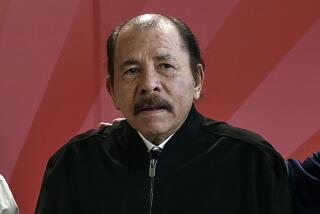‘Economic Apartheid’ Imposed, Nicaragua Business Groups Say
- Share via
MANAGUA, Nicaragua — In an unusually frank public discussion of Nicaragua’s state-planned economy, opposition business groups Thursday told President Daniel Ortega and members of his Cabinet that the ruling Sandinistas practice “economic apartheid,” discriminating against the private sector.
In a clear reference to the rightist, U.S.-backed contras, who are fighting the Sandinistas, the business leaders urged the leftist government to negotiate with “all Nicaraguans.”
“Without a political agreement, economic plans are not worth anything,” said Gilberto Quadra, acting president of the Superior Council of Private Enterprise.
The encounter took place at the civic center during one of the Sandinistas’ “Face the People” town meetings to discuss the government’s 1987 economic program. According to the private business group, this was the first time in two years that its members had been invited to one of the meetings, which are held to discuss various issues.
Ortega listened intently and took notes as Quadra and other opposition businessmen stood up to criticize price and salary controls, problems with credit and the distribution of raw materials, 40% interest rates and “arbitrary” land confiscations. Quadra said the government’s agrarian reform program has produced less food and longer lines.
Quadra also charged that state-owned business and agricultural cooperatives receive unfair advantages.
“Private industry each day suffers discriminatory and unequal treatment in the prices and quantities of the acquisition of materials, the application of laws, the availability of foreign currency necessary for investment and so on,” Quadra said. “In sum, private industry suffers an economic apartheid. . . .”
Nicolas Bolanos, vice president of the Union of Agricultural Workers of Nicaragua, said the government exercises control over all phases of production and “has dedicated itself to eliminating the private (sector).” Quadra said the primarily agricultural country is sinking due to its lack of farm production.
But pro-government farmers countered that the businessmen’s complaints were based on a sour-grapes attitude and that they were unwilling to acknowledge the damaging effects on the economy of the U.S.-backed contras’ war and an American trade embargo.
“That is a speech of resentment because now they do not have the privileges they once had,” rancher Enrique Saravia said of Quadra’s statement. “The robbery of this country is definitely over. . . . There are many producers planting here and some of them on government lands.”
At the beginning of the meeting, Planning Minister Dionisio Marenco said that the economic priority for 1987 will continue to be defense of the country, which now accounts for about half the national budget. The second priority, Marenco said, is producing exports to earn badly needed dollars, and the third is production of basic goods for Nicaragua.
Marenco said consumer prices rose 656% last year, but he said there will be no immediate overall salary raises because those would further fuel inflation. Next month, Marenco said, the government will begin to examine salary increases on a case-by-case basis.
He said the country’s negative growth rate improved from minus 4.9% in 1985 to minus 0.4% in 1986.
“The fact of having detained the decline in the growth rate is a significant achievement,” Marenco said.
Ortega said the government has been successful in finding new markets in the Soviet Union and other socialist countries and in Western Europe to replace the markets lost by the U.S. trade embargo of May, 1985.
More to Read
Sign up for Essential California
The most important California stories and recommendations in your inbox every morning.
You may occasionally receive promotional content from the Los Angeles Times.










